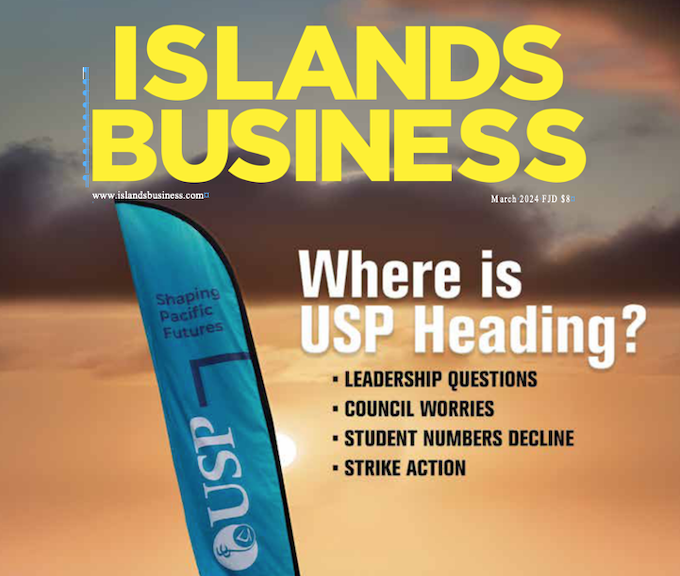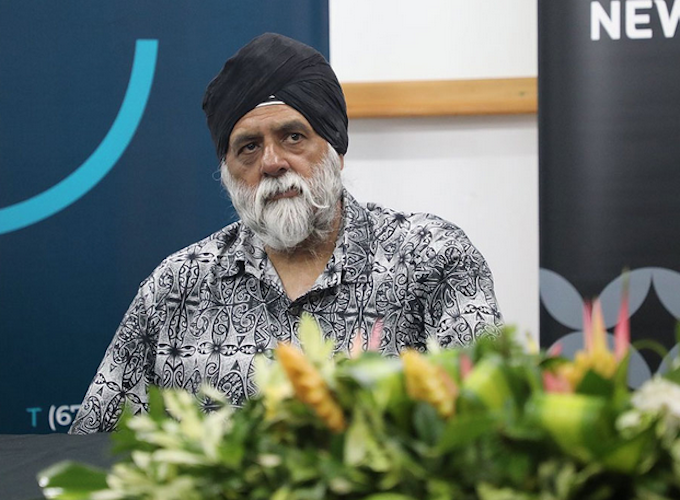The University of the South Pacific — one of only two regional universities in the world — is facing a “gathering storm” over leadership, a management crisis and a looming strike, reports Islands Business.
In the six-page cover story in the latest edition of the regional news magazine this week, IB reports that pay demands by the 12-nation institution “headline other contentions such as the number of unfilled vacancies and the strain that the unions say it’s causing staff”.
The magazine also reported concerns about the “diminishing presence of Pacific Island academics” at what is a regional institution with 30,000 students representing Cook Islands, Fiji, Kiribati, Nauru, Niue, Republic of the Marshall Islands, Samoa, Solomon Islands, Tokelau, Tonga, Tuvalu and Vanuatu.
- READ MORE: USP staff vote in favour of strike action over ‘just and fair’ pay rise
- Other USP crisis reports

The world’s other regional university is the Jamaica-based University of the West Indies with five campuses in 18 countries and 50,000 students.
Another factor at USP is the “absence of female academics, and questions over the way some key contracts have been handled by management”.
Staff say there are no longer any female professors at the Pacific university and the institution recently failed to renew the contract of Nobel Prize-winning academic Dr Elisabeth Holland, formerly professor of ocean and climate change and the longtime director of USP’s Pacific Centre for Environment and Sustainable Development (PaCE-SD), in controversial circumstances.
She had been one of USP’s most distinguished staff members and a key Pacific climate crisis voice in global forums.
Plunged into crisis
“In February 2021, the University of the South Pacific (USP) was plunged into crisis when vice-chancellor Professor Pal Ahluwalia was unceremoniously thrown out of Fiji following a middle-of-the-night raid on his campus residence, accused by the then [FijiFirst] government of Voreqe Bainimarama of breaching the country’s immigration laws,” wrote the magazine’s Fiji correspondent Joe Yaya, himself a former graduate of the university who was a member of the award-winning USP student journalism team covering the George Speight attempted coup in May 2000.
“Within months of taking up the job in 2019, a bombshell report by Ahluwalia had alleged widespread financial mismanagement within the university under former administrations. It triggered an independent investigation by New Zealand-based accounting firm BDO and Ahluwalia’s eventual expulsion from Fiji.
“Three years later, USP finds itself beset by a host of new problems, most prominent among them an overwhelming vote this month by staff across Fiji (97 percent of academic staff and 94 percent of administration and support personnel) to go on strike over pay issues.”

Some of the concerns about pay and appointments are shared by key members of the USP Council and its senior management team.
“Leadership emerged as a major point of discussion in interviews conducted by Islands Business,” wrote Yaya.
Dr Ahluwalia reportedly retains firm support from some USP Council members, and also the student association.
However, Islands Business reported that the university management had refused to respond to the magazine’s questions.
USP faces a ‘gathering storm’ over leadership and a looming strike #AsiaPacificReport #islandsbusiness #JoeYaya #FijiNews #USP #education #universities #regionaluniversity @UNESCO https://t.co/87VltV3qkV pic.twitter.com/d2GiPxtZ4h
— David Robie (@DavidRobie) March 30, 2024
Several interview efforts
“Over a seven-week period beginning January 22, we made several efforts to reach vice-chancellor Ahluwalia. In mid-February, his office said he would not be able to provide an interview while at Laucala Campus ‘because of his busy schedule’ (they specified ‘engagements with stakeholders and other university-related activities’),” the magazine reported.
“On March 6, Dr Ahluwalia responded in an email: ‘Many of the questions that you ask in relation to staff are being discussed with the respective unions and it is inappropriate for me to make comments through the media.
“‘Most of your other questions relate directly to matters that are the business of our Council and its deliberations are confidential so it is inappropriate too for me to discuss these matters outside of Council.’”
Islands Business also sought a response from Professor Pat Walsh, acting pro-chancellor of USP, and chair of the Council. Dr Walsh is the New Zealand government’s representative on the Council. He did not respond to Islands Business.
Former USP pro-chancellor and chair, now Marshall Islands President Dr Hilda Heine, told Islands Business that during her term with USP, one of the “strong challenges we faced was the issue with the vice-chancellor”.
Professor Ahluwalia’s extended work contract is expected to be finalised at next month’s Council meeting which has been moved from May to April 26-27.
The vice-chancellor is due to meet the staff unions in mediation on Tuesday in a bid to avoid a staff strike.
Republished from Asia Pacific Report.

